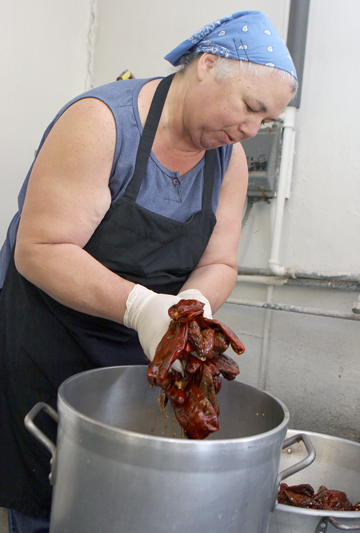Four generations pass down tradition
It’s one of Hollister’s oldest manufacturers, housed in a
nondescript and determinedly modest structure off Wright Road,
northwest of Hollister.
Four generations pass down tradition
It’s one of Hollister’s oldest manufacturers, housed in a nondescript and determinedly modest structure off Wright Road, northwest of Hollister.
El Progresso Tamale Factory produces one thing, and one thing only, the fattest, juiciest tamales anyone’s ever tried to wrap a mouth around.
Tamales are all about the masa. Masa is an art form. Begun with ground corn that’s first been treated in a lime bath, it’s beaten with lard and a judicious addition of salt.
Don’t beat it enough, and it’s a leaden mass of goo. Beat it too much and it’s dry and tough. Done just right and it’s heaven.
Tamales are gift wrapped in neat bundles of dried cornhusks. First masa is painted on, and then a filling is added.
Tamales can be dessert offerings, filled with chocolate or fruit and nuts.
They can make up the main course, filled with chiles and cheese or with meat and sauce.
The signature tamales at El Progresso contain chunks of beef, dripped in a dark chile sauce. They are enormous. But the factory also produces chicken, chile verde and green chile-cheese tamales, “basically whatever we want,” said Margaret Zuniga-Healy, one of the fourth generation owners of Progresso’s.
Once offered at local grocers, the tamales now require a trip to a restaurant the Zuniga family founded in 1939. It’s on Third Street, just east of San Benito, set behind a cactus garden that in itself is worth a trip.
Buyers who are in a rush can call ahead. The phone directory lists a different number, but generations of kids who grew up in Hollister know the insiders’ number by heart – 637-F-A-R-T.
While someone at the phone company thought that was funny once upon a time, nobody suffers gastric distress due to a trip to Progresso’s.
The factory on Wright Road is tucked into a setting of fields and orchards. Here, the tamales are assembled by hand, wrapped in corn, then a paper wrapper that’s tied tightly shut.
Taken home, they are best steamed until hot, then delivered onto a very, very large plate.
Calling it a factory might conjure up images of lines of workers, but this factory has only a single year-round employee. During periods of high demand, the Zuniga family moves employees around, Zuniga-Healy explained, to meet the demand.
In a year, 16,000 to 17,000 tamales come out of the factory, all sold through the restaurant.
“We haven’t delivered wholesale in 20 or 30 years,” Zuniga-Healy said. “It’s something we’re thinking about getting back into.”
The factory also once assembled enchiladas for wholesale distribution, but for many years has devoted itself to one item. “Tamales are easier,” Zuniga-Healy said. “They’re self-contained, packaged. They travel nicely.”
Making tamales at home is quite a production, making the store-bought variety especially attractive.
The secret to Progresso’s tamales is actually no secret, Zuniga-Healy said.
“Ours are well known because we do everything from scratch. We cook the corn, we grind it, everything.”
After nearly 70 years, it’s still a business you can really sink your teeth into.










